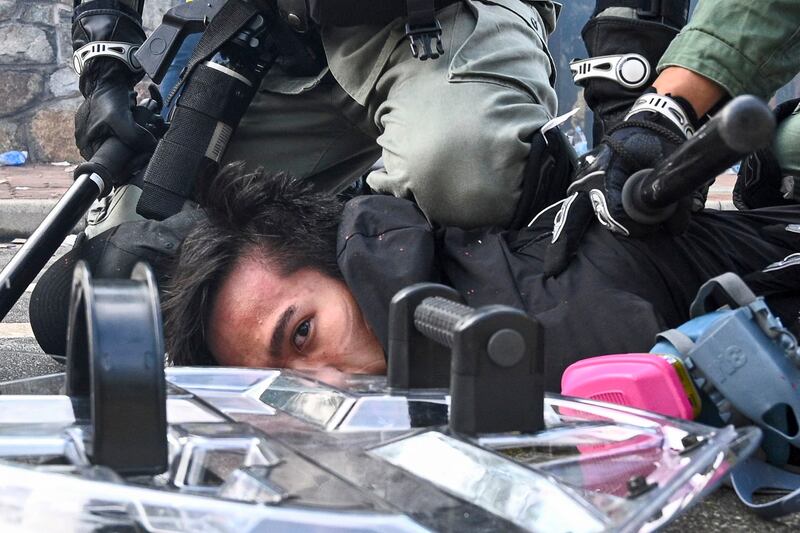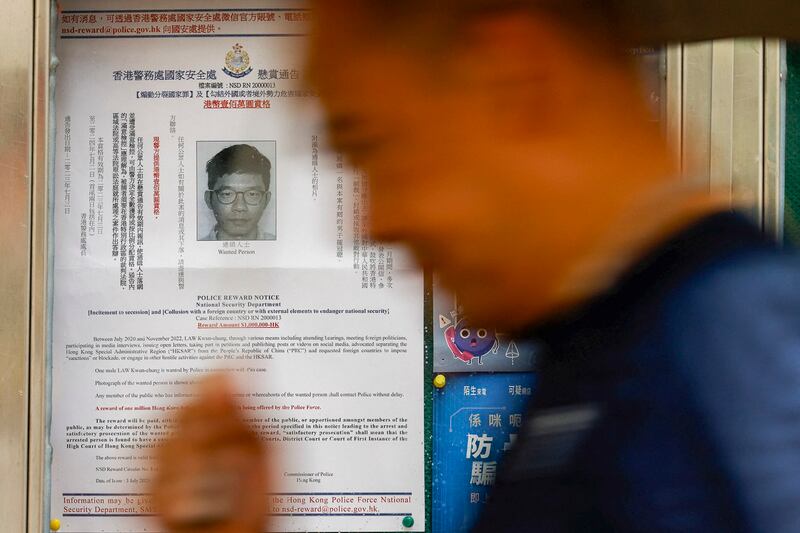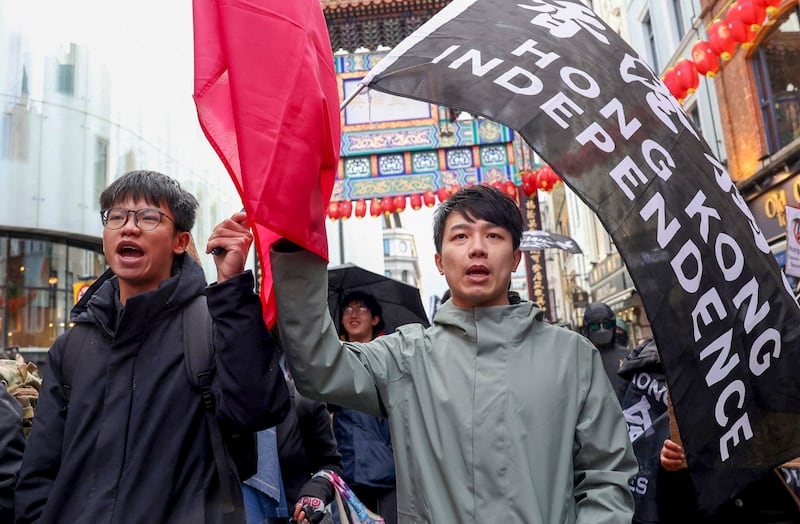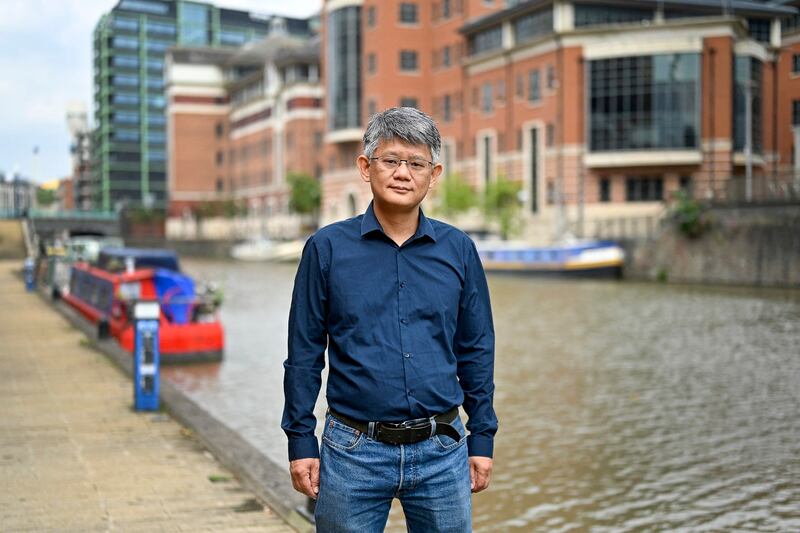Hong Kong's security chief on Wednesday revoked the Chinese passports of six U.K.-based activists including former pro-democracy lawmaker Nathan Law, imposing financial sanctions on them and hitting back at the British government for "deliberately discrediting" the city with spying charges against one of its officials.
Secretary for Security Chris Tang revoked the Chinese passports of U.K.-based activists Christopher Mung and Finn Lau, former pro-democracy lawmaker Nathan Law, former British consular employee Simon Cheng, who co-founded the advocacy group Hongkongers in Britain, and overseas YouTube hosts Johnny Fok and Tony Choi.
Tang warned that anyone found engaging in any financial transactions with them would be prosecuted.
The six, who already have arrest warrants and bounties on their heads, have been named as "fugitives" under the "Article 23" Safeguarding National Security Law passed in March, the government said in a statement.
"We are targeting these six specified fugitives who have fled to the U.K. [because] we have noticed that the British government, many politicians, organizations and media have deliberately tried to discredit our government," Tang told journalists in a briefing on Wednesday.
"The British government is prosecuting one of our colleagues at the Hong Kong Economic and Trade Office in London on trumped up charges for violating the U.K. National Security Law," Tang said.

He said the six activists "have been sheltered in the U.K. as they continue to advocate for subversion" of the Chinese government in Beijing.
Bill Yuen, an office manager at the Hong Kong Economic and Trade Office in London has been charged with spying for Hong Kong, along with British Border Force officer Peter Wai. A third defendant, former Marine Matthew Trickett, was found dead in a park last month, although British police say they aren't treating his death as suspicious.
The trio were charged with "assisting a foreign intelligence service" and "foreign interference" under the National Security Act 2023, and stand accused of forcing and entering a property in the United Kingdom and of targeting exiled Hong Kong activists on British soil, according to the Metropolitan Police and the prosecution.
Could target others
Back in Hong Kong, Tang warned that "anyone who uses any means, regardless of platform, to provide funds for these people or handle funds for them is in violation of our laws."
The authorities have also placed restrictions on real estate owned by the activists in Hong Kong, preventing them from selling it or renting it out to anyone, and revoked some of their professional qualifications and directorships, a largely symbolic move given that they are unlikely to return.

Tang said the authorities could also issue similar sanctions targeting other prominent overseas activists.
Police warned that anyone acting for the "fugitives" in financial or property matters could risk a seven-year jail term under the Article 23 legislation.
Finn Lau said via his X account that the move was announced on the fifth anniversary of a mass protest in 2019 that "symbolizes the unity of Hong Kongers," and was another example of "transnational repression" by the Chinese and Hong Kong authorities.
Lau said the cancellation of his Chinese passport was meaningless, as he has only ever held a British National Overseas, or BNO, passport, and that he would continue to advocate for human rights and democracy.
"The fighting spirit of Hongkongers, including mine, prevails," he tweeted.
‘Will only strengthen our resolve’
Simon Cheng said the measures were "politically motivated and ineffective."
"Our lives and advocacy continue unaffected in the U.K.," he said via his X account. "The attempts to silence us will only strengthen our resolve to fight for democracy and human rights in Hong Kong."

The London-based rights group Hong Kong Watch said the move was the first time the authorities had used the Article 23 law to target the passports of activists in exile.
"Hong Kong Watch condemns this outrageous manoeuver by the Hong Kong authorities to further target, intimidate and silence these six pro-democracy activists living in the UK who have simply advocated for their freedoms," the group's Chief Executive Officer Benedict Rogers said in a statement.
"It is no coincidence that the authorities have canceled their passports on the same day that millions of Hong Kongers are commemorating the fifth anniversary of the 2019 anti-extradition law protests in Hong Kong," he said.
On June 12, 2019, Hong Kong police fired rubber bullets, pepper spray, and tear gas as tens of thousands of people surrounded the city's legislature in a bid to block a debate on a law allowing extradition to mainland China.

Crowds of mainly young people shouting "Withdraw the law!" and "No China renditions!" surrounded government headquarters and the Legislative Council, which was forced to postpone a debate on the government's changes to the Fugitive Offenders Ordinance.
Wielding umbrellas and wearing masks, protesters used metal road barriers to block off access to the LegCo chamber, charging past police in full riot gear to gain access to the street outside government headquarters in Admiralty district.
While the bill was eventually withdrawn months later, protesters had by then expanded their campaign to demand fully democratic elections in the city.
By 2020, China had imposed a national security law banning criticism of the authorities and criminalizing calls for Hong Kong to hold onto its promised freedoms, ushering in a crackdown on all forms of public dissent that continues today.
Translated with additional reporting by Luisetta Mudie. Edited by Malcolm Foster.
